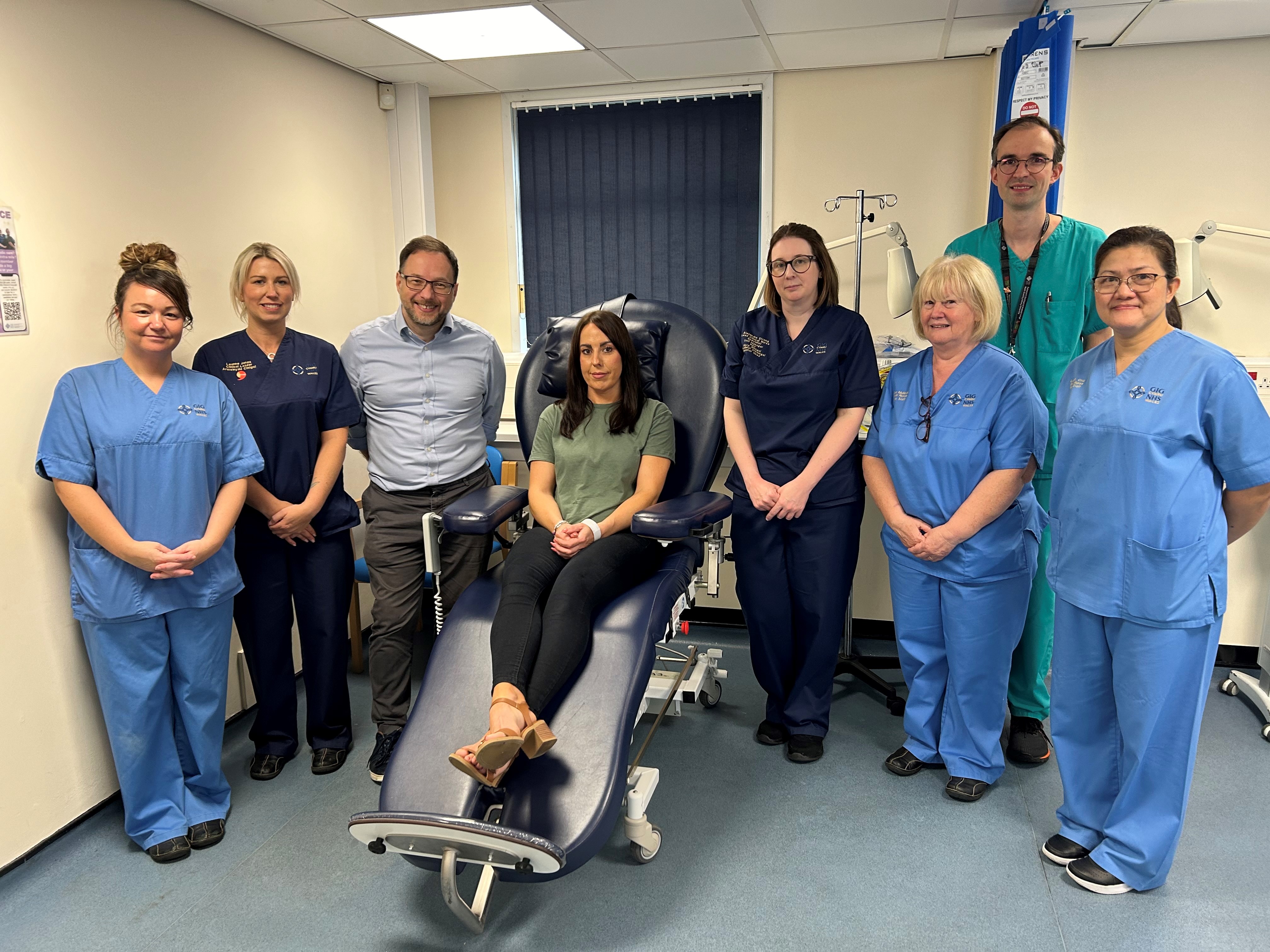For more information on this transformative MS treatment, please visit Swansea Bay University Health Board’s website, or contact Senior Communications Officer, Christie Bannon at Christie.Bannon@wales.nhs.uk.
In a UK first, Swansea Bay University Health Board has introduced an innovative 10-minute injection for multiple sclerosis (MS).

In a UK first, Swansea Bay University Health Board has introduced an innovative 10-minute injection for multiple sclerosis (MS).
This new method of administering the drug ocrelizumab significantly reduces treatment times, allowing patients to return to their daily lives more quickly. This innovation marks a major milestone in MS care, offering both time-saving benefits for patients and increased capacity for hospital staff to treat more individuals.
About the treatment
MS is a lifelong condition in which the body’s immune system attacks the central nervous system, specifically targeting the brain and spinal cord. The immune system creates cells that attack and kill viruses in the body, but for those with MS, the cells attack the nerves instead.
Swansea Bay University Health Board, previously involved in clinical trials for ocrelizumab, has become the first to offer the medication, via an under-the-skin injection. This injectable form of the drug helps to prevent relapses and slow progression of MS by targeting and eliminating specific immune cells that attack the brain and spinal cord. The treatment, used for active relapsing MS and early primary progressive MS, has now been delivered at the Jill Rowe Neurology Ambulatory Unit, Morriston Hospital.
Patient story
Emma Cullen, a civil servant from Swansea, was the first person in the UK to receive the new 10-minute injection. Prior to this, she underwent lengthy IV infusions twice a year, each taking up to four hours. She said:
“Initially I was taken into hospital with a suspected stroke as I had lost all feeling in my left side, my face had drooped, and I had pins and needles.
“I went to the Emergency Department and had a CT scan, which came back clear.
“I was referred for an MRI scan, which said there were multiple lesions in my brain and spinal cord. It was all a shock.”
Emma had to wait for another episode to occur before clinicians could confirm if she had MS.
Two years later, while out with her partner and daughter, she lost all feeling on the left side of her body again and was later diagnosed with the condition.
Emma said:
“As soon as I got over the shock of it, my mindset turned to wanting to do everything I could to prevent it getting worse. I started taking ocrelizumab, which used to be about four hours of IV treatment every six months. Since taking it, I haven’t had a relapse at all and there have been no signs of any new lesions on MRI scans.”
Dr Owen Pearson, consultant neurologist at Morriston Hospital, consulted Emma and explained about the new method, where she jumped at the opportunity. Speaking of the new procedure, Emma said it’s exactly the same treatment, just through a different method, and it will mean more people can be seen and treated quicker. She described the experience as a ‘game-change’ and was amazed at how quick a painless the injection felt. Grateful to Dr Pearson and the team, she encourages other patients to consider this method.
Project impact
The introduction of this faster treatment method is already creating a positive impact. The new approach allows patients to spend less time in hospital, freeing them to return to their daily activities sooner. For staff, it opens up more capacity to treat additional patients, reducing wait times for essential treatments.
Dr Owen Pearson, Consultant Neurologist, Morriston Hospital shared:
“From our point of view, it means we can treat more people a day. We can also shorten the time patients wait for treatment too. The quicker we can treat people, the better.
“This form of treatment gives patients the best chance of being stable and continuing to live their lives. The drug is one of the most effective forms of treatment and can reduce the risk of relapse for patients by over 80 per cent.”
Alexandra Strong, Jill Rowe Neurology Ambulatory Unit Manager, said:
“It was exciting to have the first patient in the UK at the unit. The new method will mean less time in hospital for patients and will allow us to be more flexible and provide treatment more quickly from the point of referral.
“It is an exciting change for our patients who have ocrelizumab infusions in the unit, who in time will all receive the offer of switching to the under-the-skin injection too.”
